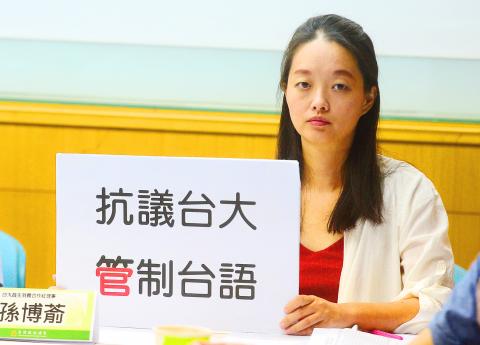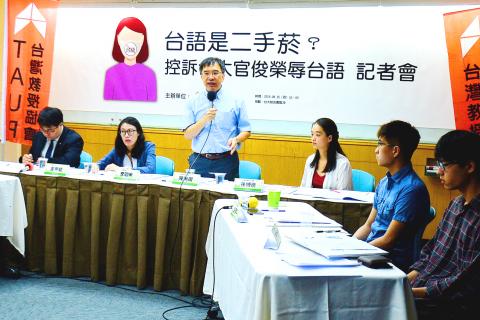Language rights advocates and academics yesterday stood up for students at National Taiwan University (NTU) who wish to speak their mother tongues, after two professors instituted a rule that school meetings must be conducted in Mandarin only.
The incident was an example of “cultural bullying,” as it prevented students from speaking in their mother tongue and had contravened the National Languages Development Act (國家語言發展法), Taiwan Association of University Professors deputy chairman Chen Li-fu (陳俐甫) said.
“It is a basic right of citizens... Yet these two professors at a leading university deprived the students of their language rights and continued the cultural oppression of Taiwanese,” Chen said.

Photo: Wang Yi-sung, Taipei Times
At a NTU Cooperative Shop board meeting on July 30, student representative Sun Phok-ju spoke in Hoklo (commonly known as Taiwanese), but was ordered to stop by chairwoman Shih Hsiu-hui (施秀惠), a biology professor, who said that agricultural economics professor Jerome Geaun (官俊榮) had proposed a motion for the meeting to be conducted in Mandarin only.
Geaun was at the June 30 meeting and justified his motion by comparing speaking Hoklo to smoking cigarettes.
“You have the liberty to smoke, but you cannot infringe on other people’s liberty,” which is why there are non-smoking areas, he said.

Photo: Wang Yi-sung, Taipei Times
Sun said that at an earlier meeting, Shih had demanded that people only use the “official language” and said that people using any other language would not be allowed to speak and would not be recorded in the meeting’s minutes.
“I talked about our rights to speak our mother tongue, and mentioned the National Languages Development Act, but it was no use. Shih would not allow us, even though we had people at the meeting who were willing to act as translators,” she said.
“Then Geaun compared people speaking Hoklo to people smoking cigarettes... He was equating speaking Hoklo to damaging other people’s health, like secondhand smoke,” Sun said. “It was a grave insult to many of us.”
Alliance to Promote Common Use of Hoklo director Khoo Hui-ing (許慧盈) said that Shih and Geaun were imposing their idea that Mandarin is a superior language to the exclusion of other languages, which would cause other languages to die out.
Attorney Huang Di-ying (黃帝穎) said that the Ministry of Education and Control Yuan should investigate the matter, as the two professors’ words and actions were discriminatory and contravened the language law.
In related news, the Ministry of Foreign Affairs announced that Taiwanese are now allowed to use the romanized spellings of their names in Hoklo, Hakka and Aboriginal languages for their passports.
It is now possible to have romanized names transliterated from one of the national languages, Bureau of Consular Affairs Director Antonio Chen (陳俊賢) told a regular news conference in Taipei.
The change comes after an amendment to Article 14 of the Enforcement Rules of the Passport Act (護照條例施行細則) was passed on Friday last week, Chen said.
Previously, only Mandarin Chinese names could be romanized.
Additional reporting by CNA

CHAOS: Iranians took to the streets playing celebratory music after reports of Khamenei’s death on Saturday, while mourners also gathered in Tehran yesterday Iranian Supreme Leader Ayatollah Ali Khamenei was killed in a major attack on Iran launched by Israel and the US, throwing the future of the Islamic republic into doubt and raising the risk of regional instability. Iranian state television and the state-run IRNA news agency announced the 86-year-old’s death early yesterday. US President Donald Trump said it gave Iranians their “greatest chance” to “take back” their country. The announcements came after a joint US and Israeli aerial bombardment that targeted Iranian military and governmental sites. Trump said the “heavy and pinpoint bombing” would continue through the week or as long

TRUST: The KMT said it respected the US’ timing and considerations, and hoped it would continue to honor its commitments to helping Taiwan bolster its defenses and deterrence US President Donald Trump is delaying a multibillion-dollar arms sale to Taiwan to ensure his visit to Beijing is successful, a New York Times report said. The weapons sales package has stalled in the US Department of State, the report said, citing US officials it did not identify. The White House has told agencies not to push forward ahead of Trump’s meeting with Chinese President Xi Jinping (習近平), it said. The two last month held a phone call to discuss trade and geopolitical flashpoints ahead of the summit. Xi raised the Taiwan issue and urged the US to handle arms sales to

State-run CPC Corp, Taiwan (CPC, 台灣中油) yesterday said that it had confirmed on Saturday night with its liquefied natural gas (LNG) and crude oil suppliers that shipments are proceeding as scheduled and that domestic supplies remain unaffected. The CPC yesterday announced the gasoline and diesel prices will rise by NT$0.2 and NT$0.4 per liter, respectively, starting Monday, citing Middle East tensions and blizzards in the eastern United States. CPC also iterated it has been reducing the proportion of crude oil imports from the Middle East and diversifying its supply sources in the past few years in response to geopolitical risks, expanding

Pro-democracy media tycoon Jimmy Lai’s (黎智英) fraud conviction and prison sentence were yesterday overturned by a Hong Kong court, in a surprise legal decision that comes soon after Lai was jailed for 20 years on a separate national security charge. Judges Jeremy Poon (潘兆初), Anthea Pang (彭寶琴) and Derek Pang (彭偉昌) said in the judgement that they allowed the appeal from Lai, and another defendant in the case, to proceed, as a lower court judge had “erred.” “The Court of Appeal gave them leave to appeal against their conviction, allowed their appeals, quashed the convictions and set aside the sentences,” the judges